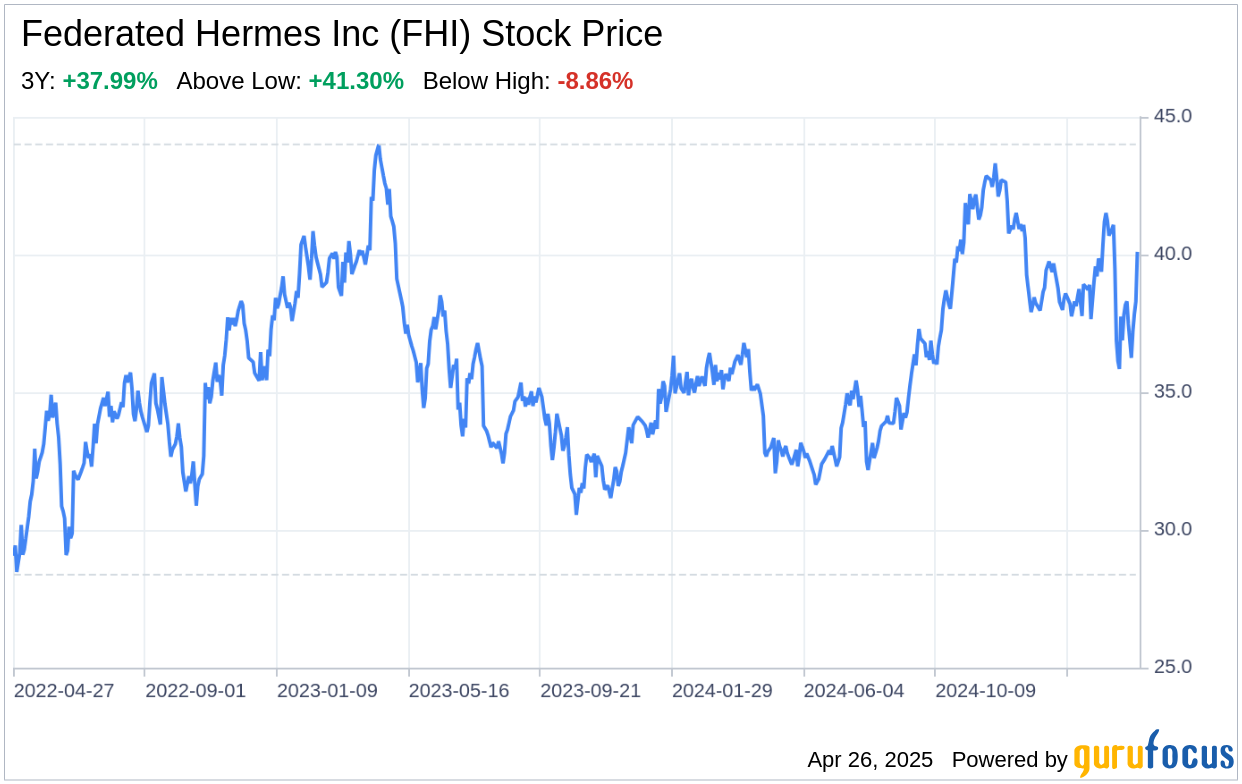On April 25, 2025, Federated Hermes Inc (FHI, Financial) filed its 10-Q report with the SEC, providing a detailed account of its financial performance for the first quarter of the year. As a leading provider of asset-management services, FHI manages a diverse portfolio of assets, including equity, multi-asset, fixed-income, alternative, and money market funds. The company's financial health, as reflected in the recent filing, shows a total asset value of $2,002.05 million, with a notable decrease in cash and cash equivalents from the previous quarter. Despite this, FHI reported a robust increase in net income from $75.03 million in Q1 2024 to $101.13 million in Q1 2025, indicating a solid financial trajectory. This SWOT analysis aims to dissect these financials and more, providing investors with a nuanced understanding of FHI's strategic position.

Strengths
Robust Revenue Growth and Profitability: Federated Hermes Inc has demonstrated a strong financial performance, with its latest 10-Q filing revealing a significant increase in net income from $75.03 million in Q1 2024 to $101.13 million in Q1 2025. This 34.8% growth in net income is a testament to the company's effective management and strategic initiatives. The increase in investment advisory fees, both from affiliates and other sources, has contributed to this uptick, with net advisory fees from affiliates rising from $202.79 million to $223.37 million in the same period. This growth in revenue streams underscores FHI's ability to attract and retain clients, as well as its capacity to generate higher fee income from its asset management services.
Diversified Asset Management Portfolio: FHI's asset management portfolio is well-diversified, with $800 billion in managed assets spread across various fund types, including equity, multi-asset, fixed-income, alternative, and predominantly money market funds. The diversification strategy not only mitigates risks associated with market volatility but also positions FHI to capitalize on different market segments. The company's money market funds, which account for 74% of the managed assets, are expected to generate approximately 51% of FHI's revenue for the year, highlighting the strategic importance of this segment to the company's overall financial health.
Weaknesses
Decline in Cash Reserves: The recent 10-Q filing indicates a decrease in cash and cash equivalents from $504.44 million at the end of December 2024 to $387.57 million at the end of March 2025. This reduction in liquidity could potentially limit FHI's ability to seize investment opportunities quickly or to respond to unforeseen financial challenges. It is crucial for the company to manage its cash flow effectively to maintain operational flexibility and to ensure it can meet short-term obligations without compromising its long-term strategic investments.
Concentration in Money Market Funds: While FHI's focus on money market funds has been a significant revenue driver, this concentration also exposes the company to sector-specific risks. Changes in interest rates, regulatory reforms, or shifts in investor preferences could adversely affect the performance of these funds. The reliance on a single asset class for the majority of revenue could be a vulnerability if the market for money market funds experiences turbulence. Diversifying revenue sources could help mitigate this risk and ensure more stable financial performance.
Opportunities
Expansion into International Markets: FHI's current distribution shows that only 9% of its AUM comes from international clients. This presents an opportunity for the company to expand its global footprint and tap into emerging markets with growing demand for asset management services. By leveraging its expertise and establishing strategic partnerships or acquisitions, FHI can diversify its client base and reduce its dependence on domestic markets, potentially driving future growth.
Technological Advancements: The asset management industry is increasingly influenced by technological innovation, including the use of artificial intelligence and machine learning for investment analysis and decision-making. FHI has the opportunity to invest in these technologies to enhance its service offerings, improve operational efficiency, and provide more personalized solutions to clients. Embracing technology can also help FHI stay competitive in a rapidly evolving industry landscape.
Threats
Regulatory Changes: As an asset management firm, FHI is subject to extensive regulation. Changes in regulatory frameworks, particularly those affecting money market funds, could impose additional compliance costs or limit the company's operational flexibility. It is essential for FHI to stay abreast of regulatory developments and adapt its business practices accordingly to mitigate the impact of potential regulatory challenges.
Market Volatility: The asset management industry is sensitive to market fluctuations, which can significantly impact AUM and, consequently, revenue. Economic downturns, geopolitical tensions, or financial market disruptions could lead to reduced investor confidence and asset outflows. FHI must maintain a robust risk management framework to navigate market volatility and safeguard its financial stability.
In conclusion, Federated Hermes Inc (FHI, Financial) exhibits a strong financial performance with significant revenue growth and a diversified asset management portfolio. However, the company faces challenges such as a decline in cash reserves and a concentration in money market funds. Opportunities for expansion into international markets and technological advancements present avenues for growth, while regulatory changes and market volatility pose potential threats. FHI's strategic focus on diversification and technology investment, coupled with vigilant risk management, will be crucial
This article, generated by GuruFocus, is designed to provide general insights and is not tailored financial advice. Our commentary is rooted in historical data and analyst projections, utilizing an impartial methodology, and is not intended to serve as specific investment guidance. It does not formulate a recommendation to purchase or divest any stock and does not consider individual investment objectives or financial circumstances. Our objective is to deliver long-term, fundamental data-driven analysis. Be aware that our analysis might not incorporate the most recent, price-sensitive company announcements or qualitative information. GuruFocus holds no position in the stocks mentioned herein.
